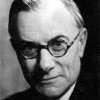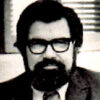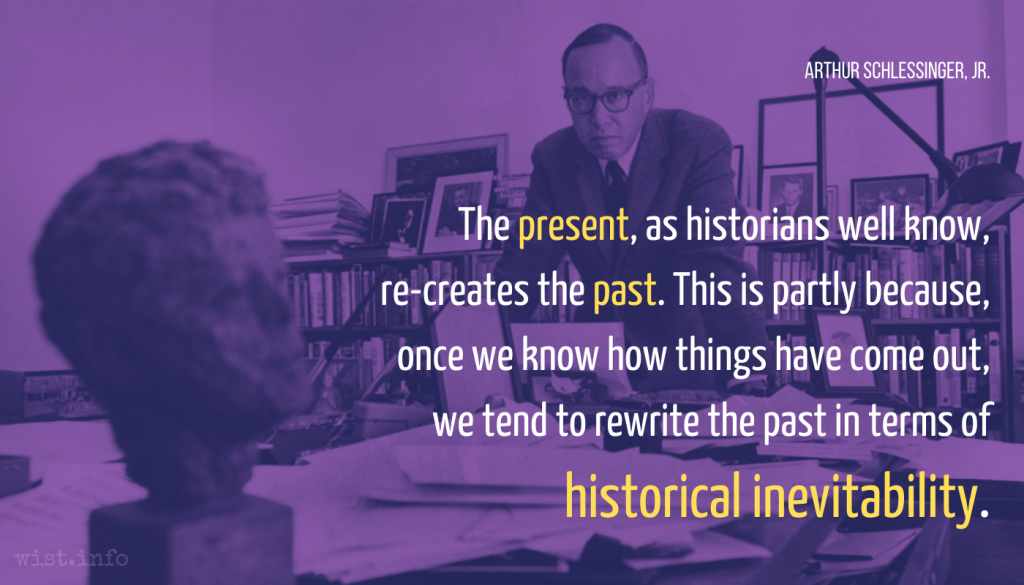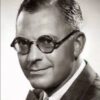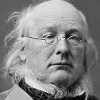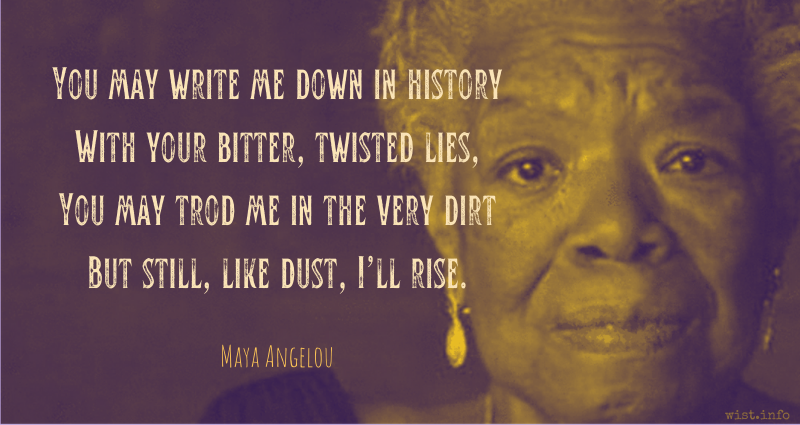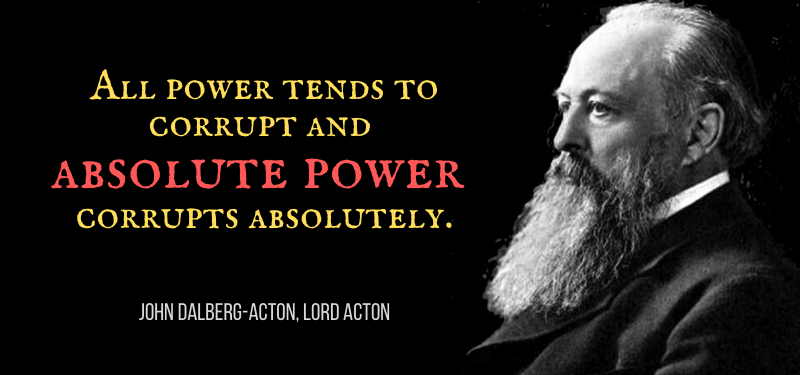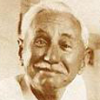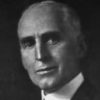Woodrow Wilson’s New Freedom promised our nation a new political and economic framework. Franklin Roosevelt’s New Deal promised security and succor to those in need. But the New Frontier of which I speak is not a set of promises — it is a set of challenges. It sums up not what I intend to offer the American people, but what I intend to ask of them. It appeals to their pride, not to their pocketbook — it holds out the promise of more sacrifice instead of more security.
Quotations about:
history
Note not all quotations have been tagged, so Search may find additional quotes on this topic.
Washington acted as the representative of the needs, the ideas, the enlightened men, the opinions of his age; he supported, not thwarted, the stirrings of intellect; he desired only what he had to desire, the very thing to which he had been called: from which derives the coherence and longevity of his work. That man who struck few blows because he kept things in proportion has merged his existence with that of his country: his glory is the heritage of civilisation; his fame has risen like one of those public sanctuaries where a fecund and inexhaustible spring flows.
All things pass in time. We are far less significant than we imagine ourselves to be. All that we are, all that we have wrought, is but a shadow, no matter how durable it may seem. One day, when the last man has breathed his last breath, the sun will shine, the mountains will stand, the rain will fall, the streams will whisper — and they will not miss him.
Writers the most learned, the most accurate in details, and the soundest in tendency, frequently fall into a habit which can neither be cured nor pardoned — the habit of making history into the proof of their theories.
John Dalberg, Lord Acton (1834-1902) British historian
“The History of Freedom in Antiquity,” Speech, Bridgenorth Institute (28 Feb 1877)
(Source)
ADVICE TO PERSONS ABOUT TO WRITE HISTORY — DON’T.
In the Moral Sciences Prejudice is Dishonesty.
A Historian has to fight against temptations special to his mode of life, temptations from Country, Class, Church, College, Party, Authority of talents, solicitation of friends.
The most respectable of these influences are the most dangerous.
The historian who neglects to root them out is exactly like a juror who votes according to his personal likes or dislikes.
In judging men and things Ethics go before Dogma, Politics or Nationality.
The Ethics of History cannot be denominational.
Judge not according to the orthodox standard of a system religious, philosophical, political, but according as things promote, or fail to promote the delicacy, integrity, and authority of Conscience.
Put conscience above both system and success.
History provides neither compensation for suffering nor penalties for wrong.
The inflexible integrity of the moral code is, to me, the secret of the authority, the dignity, the utility of History. If we may debase the currency for the sake of genius, or success, or rank, or reputation, we may debase it for the sake of a man’s influence, of his religion, of his party, of the good cause which prospers by his credit and suffers by his disgrace. Then History ceases to be a science, an arbiter of controversy, a guide of the Wanderer, the upholder of that moral standard which the powers of earth and religion itself tend constantly to depress. It serves where it ought to reign; and it serves the worst cause better than the purest.
America is far from perfect. It has blundered through arrogance, selfishness, cynicism, and a great deal through ignorance. But without America, the history of humanity in the 20th century would have been infinitely more tragic.
Dominique Moïsi (b. 1946) French political scientist and writer
In the San Francisco Chronicle (16 Dec 2001)
Every nation, like every individual, walks in a vain show — else it could not live with itself — but I never got over the wonder of a people who, having extirpated the aboriginals of their continent more completely than any modern race had ever done, honestly believed that they were a godly little New England community, setting examples to brutal mankind.
It is not difficult to show, by abundant instances, that to extend the bounds of what may be called moral police, until it encroaches on the most unquestionably legitimate liberty of the individual, is one of the most universal of all human propensities.
John Stuart Mill (1806-1873) English philosopher and economist
On Liberty, ch. 4 “Of the Limits to the Authority of Society Over the Individual” (1859)
(Source)
Down with the debunking biographer. It now seems to be quite a thing to pull down the mighty from their seats and roll them in the mire. This practice deserves pronounced condemnation. Hero worship is a tremendous force in uplifting and strengthening. Humanity, let us have our heroes. Let us continue to believe that some have been truly great; that it lies within human ability to overcome temptations and trials; that it is sublime to suffer and be strong. Petty biographers with inferior souls and jealous hearts would rob us of these happy privileges. Sensationalism is alright for yellow journalism, but in biography we wish to see our famous men and women as they were and feel the power of the strength and beauty of their lives. Down with the debunking biographer.
Lyndon B. Johnson (1908-1973) American politician, educator, US President (1963-69)
Editorial, Southwest Texas State Teachers College College Star, San Marcos (1929-07-17)
Quoted, in parts, in William C. Pool, Emmie Craddock, David Eugene Conrad, Lyndon Baines Johnson: The Formative Years, ch. 6 (1965) and Doris Kearns Goodwin, Lyndon Johnson and the American Dream, ch. 2 (1976).
In fact, the French — who read and theorize the most — became so addicted to political experiment that in the two centuries since our own rather drab revolution they have exuberantly produced one Directory, one Consulate, two empires, three restorations of the monarchy, and five republics. That’s what happens when you take writing too seriously.
It is reasonable to assume that, by and large, what is not read now will not be read, ever. It is also reasonable to assume that practically nothing that is read now will be read later. Finally, it is not too far-fetched to imagine a future in which novels are not read at all.
Considering history as a moral exercise, her lessons would be too unfrequent if confined to real life. Of those recorded by historians few incidents have been attended with such circumstances as to excite in any high degree this sympathetic emotion of virtue. We are therefore wisely framed to be as warmly interested for a fictitious as for a real personage. The spacious field of imagination is thus laid open to our use, and lessons may be formed to illustrate and carry home to the mind every moral rule of life. Thus a lively and lasting sense of filial duty is more effectually impressed on the mind of a son or daughter by reading King Lear, than by all the dry volumes of ethics and divinity that ever were written.
Thomas Jefferson (1743-1826) American political philosopher, polymath, statesman, US President (1801-09)
Letter to Robert Skipwith (3 Aug 1771)
(Source)
All the important human advances that we know of since historical times began have been due to individuals of whom the majority faced virulent public opposition.
Bertrand Russell (1872-1970) English mathematician and philosopher
Interview by Woodrow Wyatt, BBC TV (1959)
Collected in Bertrand Russell's BBC Interviews (1959) [UK] and Bertrand Russell Speaks His Mind (1960) [US]. Reprinted (abridged) in The Humanist (1982-11/12), and in Russell Society News, #37 (1983-02).
The main work of the historian is not to record, but to evaluate; for, if he does not evaluate, how can he know what is worth recording?
E. H. Carr (1892-1982) British historian, journalist, international relations theorist [Edward Hallett "Ted" Carr]
What is History?, ch. 1 (1961)
(Source)
Recounting the historiographical writings of Benedetto Croce in the 1920s.
Men make their own history, but they do not make it just as they please; they do not make it under circumstances chosen by themselves but under circumstances directly encountered, given and transmitted from the past. The tradition of all the dead generations weighs like a nightmare on the brains of the living.
Karl Marx (1818-1883) German philosopher, economist, sociologist, historian, journalist
The Eighteenth Brumaire of Louis Napoleon, ch. 1 (1852)
(Source)
History, like beauty, depends largely on the beholder, so when you read that, for example, David Livingstone discovered the Victoria Falls, you might be forgiven for thinking that there was nobody around the Falls until Livingstone arrived on the scene.
Desmond Tutu (1931-2021) South African cleric, Anglican Archbishop of Cape Town, Nobel Laureate
“Fortieth Anniversary of the Republic,” speech (1981)
See Richard Cumberland.
For my part, I consider that it will be found much better by all parties to leave the past to history, especially as I propose to write that history myself.
Winston Churchill (1874-1965) British statesman and author
Speech, House of Commons (23 Jan 1948)
(Source)
Sometimes given: "History will bear me out, particularly as I shall write that history myself." More discussion here: Churchillisms: "Leave the Past to History" (which He will Write).
No one can understand history without continually relating the long periods which are constantly mentioned to the experiences of our own short lives. Five years is a lot. Twenty years is the horizon to most people. Fifty years is antiquity. To understand how the impact of destiny fell upon any generation of men one must first imagine their position and then apply the time-scale of our own lives.
What are all the records of history, but narratives of successive villainies, of treasons and usurpations, massacres and wars?
Samuel Johnson (1709-1784) English writer, lexicographer, critic
The Rambler, #175 (19 Nov 1751)
(Source)
The present, as historians well know, re-creates the past. This is partly because, once we know how things have come out, we tend to rewrite the past in terms of historical inevitability.
Poetry is more philosophical and more serious than history; poetry utters universal truths, history particular statements.
[διὸ καὶ φιλοσοφώτερον καὶ σπουδαιότερον ποίησις ἱστορίας ἐστίν: ἡ μὲν γὰρ ποίησις μᾶλλον τὰ καθόλου, ἡ δ᾽ ἱστορία τὰ καθ᾽ ἕκαστον λέγει.]
Aristotle (384-322 BC) Greek philosopher
Poetics [Περὶ ποιητικῆς, De Poetica], ch. 9 / 1451b.5 (c. 335 BC) [tr. Kenny (2013)]
Original Greek. Alternate translations:
Poetry, therefore, is a more philosophical and a higher thing than history: for poetry tends to express the universal, history the particular.
[tr. Butcher (1895)]
Poetry is something more philosophic and of graver import than history, since its statements are of the nature rather of universals, whereas those of history are singulars.
[tr. Bywater (1909)]
Poetry is the more scientific and the higher class; for it generalizes rather, whereas history particularizes.
[tr. Margoliouth (1911)]
Poetry is something more scientific and serious than history, because poetry tends to give general truths while history gives particular facts.
[tr. Fyfe (1932)]
Poetry is more philosophical and more serious than history; in fact, poetry speaks more of universals, whereas history of particulars.
[tr. Halliwell (1986)]
Poetry is a more philosophical and more serious thing than history: poetry tends to speak of universals, history of particulars.
[tr. Janko (1987), sec. 3.2.3]
Poetry is more philosophical and more serious than history; poetry tends to speak of universals, history of particulars.
[tr. Janko (1987), sec. 3.2.3]
Poetry is more speculative and more serious business than history: for poetry deals more with universals, history with particulars.
[tr. Whalley (1997)]
Poetry is a more philosophical and more serious thing than history, since poetry speaks more of things that are universal, and history of things that are particular.
[tr. Sachs (2006)]
Poetry is finer and more philosophical than history; for poetry expresses the universal, and history only the particular.
[tr. Unknown]
You read something which you thought only happened to you, and you discover that it happened 100 years ago to Dostoyevsky. This is a very great liberation for the suffering, struggling person, who always thinks that he is alone. This is why art is important. Art would not be important if life were not important, and life is important.
James Baldwin (1924-1987) American novelist, playwright, activist
“An interview with James Baldwin” by Studs Terkel (1961), in Conversations With James Baldwin (1989)
(Source)
Baldwin revisited this theme multiple times.
You think your pain and your heartbreak are unprecedented in the history of the world, but then you read. It was Dostoevsky and Dickens who taught me that the things that tormented me most were the very things that connected me with all the people who were alive, or who had ever been alive. Only if we face these open wounds in ourselves can we understand them in other people. An artist is a sort of emotional or spiritual historian.
[Interview with Jane Howard, Life Magazine (24 May 1963)]
You think your pain and your heartbreak are unprecedented in the history of the world, but then you read. It was books that taught me that the things that tormented me most were the very things that connected me with all the people who were alive, or who had ever been alive.
["James Baldwin Recalls His Childhood," quoting from a television program, New York Times (31 May 1964)]
Never in History has the average American citizen found more need for a saving sense of humor. Beset by threats of destruction by atomic bombs, inflation, mounting taxes, overcrowded cities, witch hunters, propagandists, caterwauling commentators, and the incessant clamor of radio and television commercials, he must laugh occasionally to keep from blowing his top altogether. It’s far too easy to see only the shadows, and ignore the patches of sunlight that remain.
Bennett Cerf (1898-1971) American publisher, humorist
Laughter Incorporated, Foreword (1950)
(Source)
War is mainly a catalogue of blunders.
Winston Churchill (1874-1965) British statesman and author
The Second World War, Vol. 3: The Grand Alliance, ch. 20 “The Soviet Nemesis” (1950)
(Source)
Specifically, on the USSR failing to form an allied front in the Balkans against Hitler prior to his attack on them.
Ask counsel of both times — of the ancienter time what is best, and of the latter time what is fittest.
Francis Bacon (1561-1626) English philosopher, scientist, author, statesman
“Of Great Place,” Essays, No. 11 (1625)
(Source)
Fame is a vapor; popularity an accident; riches take wings; the only earthly certainty is oblivion ….
Horace Greeley (1881-1872) American newspaper editor, reformer, politician
Recollections of a Busy Life, ch. 18 (1868)
(Source)
Quoted by Mark Twain in his Notebook (1869), and often attributed to him. Frequently misquoted as "Fame is a vapor; popularity an accident; riches take wings; those who cheer today will curse tomorrow; only one thing endures: character." More discussion of this quotation here.
Such things will cease to be written when men perceive that truth is the only merit that gives dignity and worth to history.
John Dalberg, Lord Acton (1834-1902) British historian
“The Massacre of St Bartholomew,” North British Review (Oct 1869)
Referencing Catholic denial and revisionism over the St Bartholomew's Day Massacre. Usually elided to start with "Truth is ..."
Collected in The History of Freedom and Other Essays (1907)
You may write me down in history
With your bitter, twisted lies,
You may trod me in the very dirt
But still, like dust, I’ll rise.Maya Angelou (1928-2014) American poet, memoirist, activist [b. Marguerite Ann Johnson]
“Still I Rise,” And Still I Rise (1978)
(Source)
It must be remembered that we have only heard one side of the case. God has written all the books.
Samuel Butler (1835-1902) English novelist, satirist, scholar
The Note-Books of Samuel Butler, “An Apology for the Devil” (1912)
Full text.
It may help to understand human affairs to be clear that most of the great triumphs and tragedies of history are caused, not by people being fundamentally good or fundamentally bad, but by people being fundamentally people.
Terry Pratchett (1948-2015) English author
Good Omens, 2. “Eleven Years Ago” (1990) [with Neil Gaiman]
(Source)
Great minds are related to the short span of time wherein they live as are large buildings to the narrow plot of ground on which they stand. Thus large buildings are not seen to their full extent because we are too close to them.
[Zu der kurzen Spanne Zeit, in der sie leben, verhalten sich die großen Geister wie große Gebäude zu einem engen Plage, auf dem sie stehn. Man sieht nämlich diese nicht in ihrer Größe, weil man zu nahe davor steht.]
Arthur Schopenhauer (1788-1860) German philosopher
Parerga and Paralipomena, Vol. 2, ch. 20 “On Judgement, Criticism, Approbation, and Fame [Über Urtheil, Kritik, Beifall und Ruhm],” § 242 (1851) [tr. Payne (1974)]
(Source)
(Source (German)). Alternate translation:
Compared with the short span of time they live, men of great intellect are like huge buildings, standing on a small plot of ground. The size of the building cannot be seen by anyone, just in front of it.
[tr. Saunders (1890)]
Great minds are related to the brief span of time during which they live as great buildings are to a little square in which they stand: you cannot see them in all their magnitude because you are standing too close to them.
[tr. Hollingdale (1970)]
Those who compare the age in which their lot has fallen with a golden age which exists only in imagination, may talk of degeneracy and decay; but no man who is correctly informed as to the past, will be disposed to take a morose or desponding view of the present.
As to the history of the revolution, my ideas may be peculiar, perhaps singular. What do we mean by the revolution? The war? That was no part of the revolution; it was only an effect and consequence of it. The revolution was in the minds of the people, and this was effected from 1760 to 1775, in the course of fifteen years, before a drop of blood was shed at Lexington.
For of those to whom much is given, much is required. And when at some future date the high court of history sits in judgment on each of us — recording whether in our brief span of service we fulfilled our responsibilities to the state — our success or failure, in whatever office we hold, will be measured by the answers to four questions:
First, were we truly men of courage — with the courage to stand up to one’s enemies — and the courage to stand up, when necessary, to one’s associates — the courage to resist public pressure, as well as private greed?
Secondly, were we truly men of judgment — with perceptive judgment of the future as well as the past — of our mistakes as well as the mistakes of others — with enough wisdom to know what we did not know and enough candor to admit it.
Third, were we truly men of integrity — men who never ran out on either the principles in which we believed or the men who believed in us — men whom neither financial gain nor political ambition could ever divert from the fulfillment of our sacred trust?
Finally, were we truly men of dedication — with an honor mortgaged to no single individual or group, and comprised of no private obligation or aim, but devoted solely to serving the public good and the national interest?
Courage — judgment — integrity — dedication — these are the historic qualities … which, with God’s help … will characterize our Government’s conduct in the four stormy years that lie ahead.
John F. Kennedy (1917-1963) US President (1961-63)
Address to the Massachusetts legislature (9 Jan 1961)
(Source)
As President-elect. The reference is to Luke 12:48.
Our ignorance of history makes us calumniate our own time. We have always been like this. Some calm years have deceived us. That is all. I too believed in the softening of manners. We must erase this error and esteem ourselves no more than people esteemed themselves in the time of Pericles or Shakespeare, atrocious epochs in which fine things were done.
[On a toujours été comme ça. Quelques années de calme nous ont trompés. Voilà tout. Moi aussi, je croyais à l’adoucissement des mœurs. Il faut rayer cette erreur et ne pas s’estimer plus qu’on ne s’estimait du temps de Péricles ou de Shakespeare, époques atroces où on a fait de belles choses.]
Gustave Flaubert (1821-1880) French writer, novelist
Letter to George Sand (8 Sep 1871) [tr. Tarver]
(Source)
Original French.
Alternate translation: "Our ignorance of history causes us to slander our own times."
I cannot accept your canon that we are to judge Pope and King unlike other men, with a favourable presumption that they did no wrong. If there is any presumption it is the other way against holders of power, increasing as the power increases. Historic responsibility has to make up for the want of legal responsibility. All power tends to corrupt and absolute power corrupts absolutely. Great men are almost always bad men, even when they exercise influence and not authority: still more when you superadd the tendency or the certainty of corruption by authority. There is no worse heresy than that the office sanctifies the holder of it.
John Dalberg, Lord Acton (1834-1902) British historian
Letter to Bp. Mandell Creighton (3 Apr 1887)
(Source)
Often paraphrased, "Power corrupts, and absolute power corrupts absolutely."
There is an alternate, probably spurious version of this quote, for which I have been unable to find an actual citation (except where it is mis-cited to this letter to Bp. Creighton): "And remember, where you have a concentration of power in a few hands, all too frequently men with the mentality of gangsters get control. History has proven that. All power corrupts; absolute power corrupts absolutely." As the word "gangster" has only been traced back to 1886, and that in the US, its use by Acton (esp. in a modern sense) seems unlikely.
Civilization is a stream with banks. The stream is sometimes filled with blood from people killing, stealing, shouting and doing things historians usually record, while on the banks, unnoticed, people build homes, make love, raise children, sing songs, write poetry, and even whittle statues. The story of civilization is the story of what happened on the banks. Historians are pessimists because they ignore the banks for the river.
William James (Will) Durant (1885-1981) American historian, teacher, philosopher
Quoted in Jim Hicks, “Spry Old Team Does It Again,” Life (18 Oct 1963)
(Source)
Durant says this is what he came up with when asked to sum up civilization in a half-hour ("I did it in less than a minute, this way").
This source is Durant recounting the passage in a Life magazine interview, which is often mis-cited as the origin. The quote is also sometimes vaguely attributed to his and Ariel Durant's The Story of Civilization, their 11-volume work (1935-75) (the Life article was on the publication of Vol. 8, The Age of Louis XIV (1963)), but I cannot find it in any of the volumes to that date.
Whom the gods would destroy they first make mad with power;
The mills of God grind slowly, but they grind exceedingly small;
The bee fertilizes the flower it robs;
When it is dark enough, you can see the stars.Charles Beard (1874-1948) American historian
Summary of human history, in reply to George S. Counts
Every observation of history inspires a confidence that we shall not go far wrong; that things will mend.
Ralph Waldo Emerson (1803-1882) American essayist, lecturer, poet
“The Young American,” lecture, Mercantile Library Association, Boston (1844-02-07)
(Source)
Everybody knows that the first law of history is not daring to say anything false; that the second is daring to say everything that is true; that there should be no suggestion of partiality, none of animosity when you write.
[Nam quis nescit primam esse historiae legem, ne quid falsi dicere audeat? Deinde ne quid veri non audeat? Ne quae suspicio gratiae sit in scribendo? Ne quae simultatis?]
Marcus Tullius Cicero (106-43 BC) Roman orator, statesman, philosopher
De Oratore [On the Orator, On Oratory], Book 2, ch. 15 (2.15) / sec. 62 (55 BC) [tr. May/Wisse (2001)]
(Source)
(Source (Latin)). Alternate translations:
For, is there a Man ignorant, that the first Rule of History is, that an Historian shall not dare to advance a Falsity; the next, that there is no Truth but what he shall dare to tell? That in Writing, he shall be free of all Prepossession; of all Pique?
[tr. Guthrie (1755)]
For, is there a man ignorant that the first rule of history is that an historian shall not dare to advance a falsehood; the next, that there no truth but what he shall dare to tell? That the writer should be actuated neither by favour, or by prejudice?
[Source (1808)]
For who is ignorant that it is the first law in writing history, that the historian must not dare to tell any falsehood, and the next, that he must be bold enough to tell the whole truth? Also, that there must be no suspicion of partiality in his writings, or of personal animosity?
[tr. Watson (1860)]
Who need be informed that the first law of history is, to have the honesty to state no falsehood, the next, the courage to suppress no truth, and to avoid all suspicion of undue bias or personal animosity?
[tr. Calvert (1870)]
Who does not recognise that the first law of history is that we shall never dare to say what is false; the second that we shall never fear to say what is true; that everything we write shall be free from any suspicion of favoritism or flattery?
[ed. Harbottle (1906)]
For who does not know history's first law to be that an author must not dare to tell anything but the truth ? And its second that he must make bold to tell the whole truth? That there must be no suggestion of partiality anywhere in his writings? Nor of malice?
[tr. Sutton/Rackham (1940)]
The first law for the historian is that he shall never dare utter an untruth. The second is that he shall suppress nothing that is true. Moreover, there shall be no suspicion of partiality in his writing, or of malice.
[Bartlett's]
But the iniquity of oblivion blindely scattereth her poppy, and deals with the memory of men without distinction to merit of perpetuity. […] Who knows whether the best of men be known? or whether there be not more remarkable persons forgot, then any that stand remembred in the known account of time?
Thomas Browne (1605-1682) English physician and author
Hydriotaphia, or Urne-Buriall, ch. 5 (1658)
(Source)
An historian is an unsuccessful novelist.
H. L. Mencken (1880-1956) American writer and journalist [Henry Lewis Mencken]
A Little Book in C Major, ch. 7, § 21 (1916)
(Source)
Variants:
HISTORIAN. An unsuccessful novelist.
[A Book of Burlesques, "The Jazz Webster" (1924)]
Historian - An unsuccessful novelist.
[Chrestomathy, ch. 30 "Sententiae" (1949)]
If the Party could thrust its hand into the past and say of this or that event, it never happened — that, surely, was more terrifying than mere torture and death? The Party said that Oceania had never been in alliance with Eurasia. He, Winston Smith, knew that Oceania had been in alliance with Eurasia as short a time as four years ago. But where did that knowledge exist? Only in his own consciousness, which in any case must soon be annihilated. And if all others accepted the lie which the Party imposed — if all records told the same tale — then the lie passed into history and became truth. “Who controls the past,” ran the Party slogan, “controls the future: who controls the present controls the past.”
George Orwell (1903-1950) English writer [pseud. of Eric Arthur Blair]
Nineteen Eighty-Four (1949)
(Source)
Sometimes paraphrased, "He who controls the past controls the future. He who controls the present controls the past."
If we could read the secret history of our enemies, we should find in each man’s life sorrow and suffering enough to disarm all hostility.
Henry Wadsworth Longfellow (1807-1882) American poet
“Table Talk,” Drift-Wood (1857)
(Source)
More discussion of this quotation here: If We Could Read the Secret History of Our Enemies, We Should Find in Each Man’s Life Sorrow and Suffering Enough To Disarm All Hostility – Quote Investigator.














